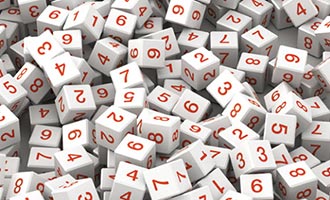Random Number Generators – How Online Casinos Keep Things Fair
 When playing blackjack at an online casino, gamblers aren’t physically dealt cards from a deck. The same can be said for roulette; there’s no dealer spinning an actual wheel. Nobody rolls a real pair of dice at the craps tables, nor do they manually spin the reels of the slot machines. No, at an online casino, each of these actions are simulated. To keep the games fair, the software must ensure that the outcomes can’t be predicted and that they are truly random. The software component that handles this task is referred to as the RNG, or random number generator. An obvious exception are live dealer games. These games have actual dealers who generate outcomes manually in real-time.
When playing blackjack at an online casino, gamblers aren’t physically dealt cards from a deck. The same can be said for roulette; there’s no dealer spinning an actual wheel. Nobody rolls a real pair of dice at the craps tables, nor do they manually spin the reels of the slot machines. No, at an online casino, each of these actions are simulated. To keep the games fair, the software must ensure that the outcomes can’t be predicted and that they are truly random. The software component that handles this task is referred to as the RNG, or random number generator. An obvious exception are live dealer games. These games have actual dealers who generate outcomes manually in real-time.
The random number generator is activated whenever an action is put in motion such as the click of the Spin or Deal button. Once activated, a random number is generated by the software in association with this specific event. So, for example, in a game of blackjack, a random number might be assigned to a ten of hearts, so when the RNG produces that particular random number, the software converts it to the virtual action of dealing a ten of hearts. So, while the events taking place on the screen occur in an immediate and fluid manner, the chain of events occurring within the software itself is somewhat more complicated.
Random Number Generators in Online Casino Games
The random number that is generated is based on an intricate mathematical algorithm. Were it to be done manually, each individual event could take hours, or even days. However, since today’s computers have such high speed processors, these events are processed within milliseconds. As part of the licensing process, online casino operators must engage the services of a third-party auditor to ensure that the outcomes generated by the RNG are in fact random. This independent third-party performs rigorous tests to validate the algorithm before it is ever put into use by the general public. The objective of this is two-fold. The first is that it should never be even a remote possibility that some pattern might exist whereby an outcome could possibly be predicted. A fundamental principle upon which online casinos operate is that a past outcome should have no impact on a future one. So, for example, the result of a single spin of a roulette wheel should not have any bearing on the outcome of any subsequent spins. Secondly, even probabilities should be evenly distributed. This means that there must be an equal probability of each card in a shuffled deck being dealt. RNGs run for thousands of potential outcomes and are audited to ensure proper distribution.
Upon passing the required tested and ultimately being approved, the software, as well as the RNG component are sealed. Once sealed, it cannot be modified for any reason by the software provider or the operator of the online casino itself. And this is not a “set and forget” scenario where everyone is expected to conduct themselves on an honour system. No, as a safety precaution, licensing bodies require that the online casino operators enlist the services of an independent third-party operator to test the RNG on an ongoing basis to ensure that it remains random. This requirement is essential as it allows players to feel safe knowing that the games are indeed fair and the outcomes are not being manipulated to their disadvantage.
Comments are closed